I have a 2.5 year old weimaraner named Remy, and this post is about one of the issues we have with him: play biting people’s hands when he’s excited. (And he’s usually excited!)
By that, I mean he gently bites at people when they try to pet him, almost like a 10-week-old puppy would do.
He’s gentle about it and his teeth aren’t as sharp as a puppy’s, but it’s a similar behavior. I was always assuming he would grow out of this, and hopefully he still will! (Weims are very immature for a long time!)
So while this post is mostly about Remy, if you scroll to the middle, I list out 7 tips for how to stop your adult dog from mouthing and play biting people’s hands. Feel free to leave your questions or suggestions in the comments, too.
QUICK RECOMMENDATION: My puppies have drawn blood with their teeth many times. The Milunova Pupr Pals™ Dog Toy is a plush squirrel puppet toy that helps to protect your hands from those sharp puppy teeth during play.
For puppies that bite, see my post: How to stop a puppy from biting and jumping.
Why my adult dog play bites people’s hands (every dog is different)
Thankfully, my dog Remy does not bite hard. Actually, he’s gentle, but it’s not like anyone wants their hands bitten or “mouthed.”
To be honest, I do not really care that he “bites” because he’s so gentle. I wish he wouldn’t do it, but I don’t really care unless a friend or stranger occasionally complains about it.
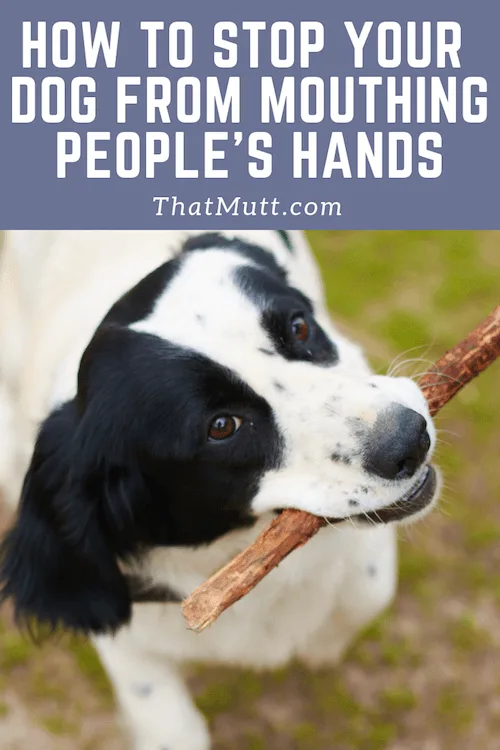
I’m not exaggerating when I say Remy bites/mouths everyone who tries to pet him. It is directly related to his huge amounts of energy and excitement and lack of impulse control.
Unfortunately, this means most people can’t pet him even though that’s what he wants more than anything! He love people so, so much!
My husband Josh and I have also noticed that when Remy mouths people’s hands he is checking to see if they have treats.
This is a big reason why I prefer calming obedience training for my dog with structure and quiet verbal praise instead of showering him with treats and a high-pitched voice. My dog needs to be calmed down, not hyped up. Read more about that here.
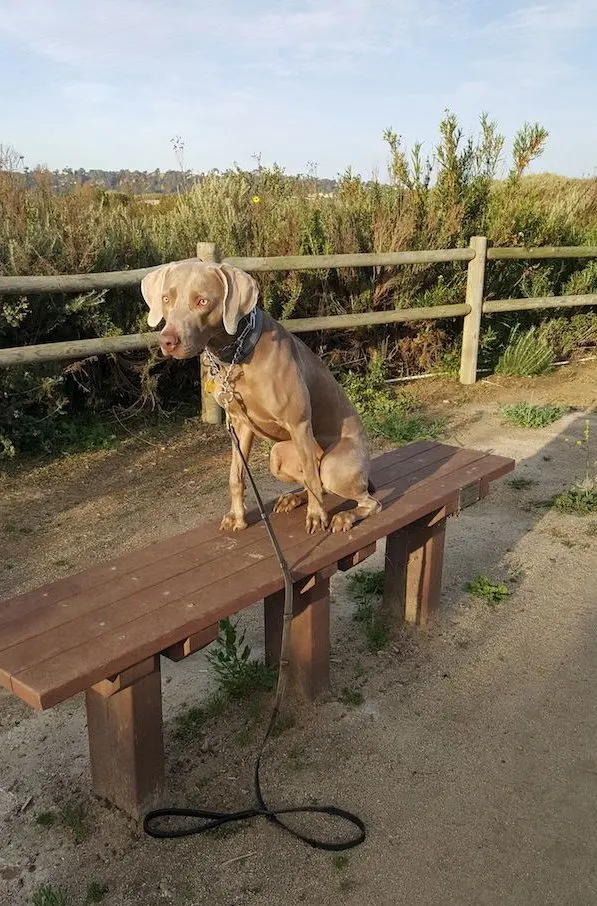
Adult dog play biting at the vet
A larger problem for me is that Remy is so excited at the vet that he mouths and bites anyone who tries to examine him.
Our current vet has to spread peanut butter on the wall for Remy in the exam room. It’s the only way to keep him still. He stands there licking the peanut butter so she can touch him.
This vet is so annoyed by Remy (understandably so) that I am searching for a new vet who is more tolerant of obnoxious dogs. BUT, I do know I need to work with Remy so he’s not so mouthy in the exam room no matter which vet we see.
So … how do you stop a dog or puppy from “play” biting?
General advice: How to stop a puppy from biting
Here are all the usual tricks and tips to stop a puppy from biting and mouthing your hands, feet or clothing. I tried all of these with Remy, and they all work to an extent.
The real concept to take from this is you need to be consistent, firm and serious.
How to stop a puppy from biting:
- Use a firm “no”
- Hold the puppy’s mouth shut and say “no”
- Ignore the puppy when he bites
- Leave the room for a few seconds
- “Yelp” in surprise
- Hand the puppy a toy or bully stick
- Spray the puppy with a squirt bottle of water
- Use bitter apple spray on your hands (tastes bad to them)
In Remy’s case, what truly worked when he was little and probably still works best is to give a firm “no” for biting and then hand him something else to bite on.
Then to truly ignore him if he continues. Like, to really give him the cold shoulder and to get up and leave the room if needed.
I find that most people do not understand how to truly ignore a dog. So here is what I mean. No …
- looking at the dog
- talking to the dog
- scolding the dog
- talking about the dog to someone else
- laughing at the dog
- petting the dog
- playing with the dog
- pushing the dog away or holding him back
You have to be emotionless and focus on something else like the TV or your phone or a conversation with someone else or whatever. It’s also best if you sit up straight and put your side or back to your dog.
Also see my post: How to stop my dog from pawing at me
More details and ideas: How to stop adult dog from play biting hands
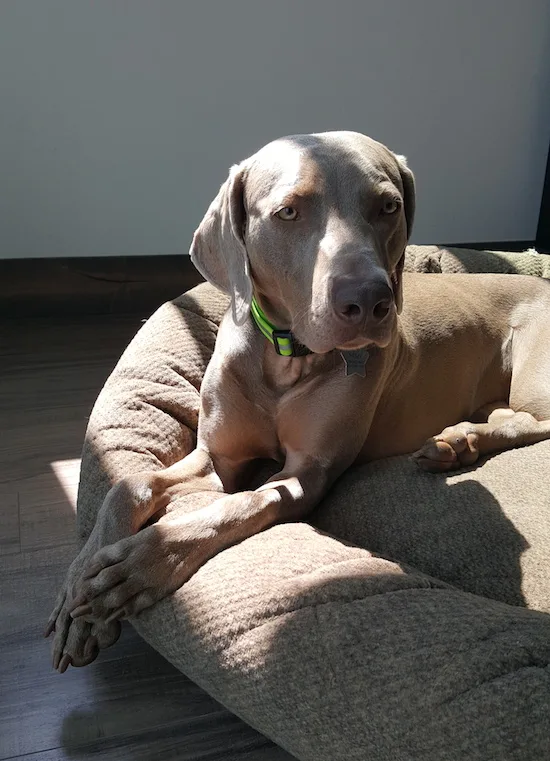
The following are some ideas I’m going to try with Remy now that he’s older. Some of these may be helpful for others, but just use them to brainstorm for your unique dog.
For puppies that bite, see my post: How to stop a puppy from biting and jumping. Also, this post from Puppy in Training.
How to stop adult dog from play biting hands
1. Do not engage with the behavior at all.
As explained above, truly ignore your dog when he’s biting people’s hands. I don’t know why this is so difficult, but it is.
Dogs really do stop a behavior when the behavior is not being rewarded or reinforced.
My dog wants attention so badly, but if he doesn’t get attention for biting and pawing at people, he does stop.
The key is to truly ignore him and to go back to ignoring him the second he gets “wild” again!
See my post: How to stop aggressive play jumping
2. Pet under the chin, not over the head.
A friend suggested this to me (hi, Maren!) and she was right, it helps. For whatever reason, when you reach over a dog or towards their head, they are more likely to bite at you.
When I pet Remy under the chin, it’s harder for him to bite and at the same time, petting him under the chin seems to calm him.
3. Keep your dog on a leash when people visit.
This is not going to stop your problem but it’s a management trick and sometimes, hey, you just have to manage your dog.
On the plus side, at least if you are keeping your dog on a leash he is not repeating the habit of biting and mouthing people.
For more info: How to keep my dog calm around visitors.
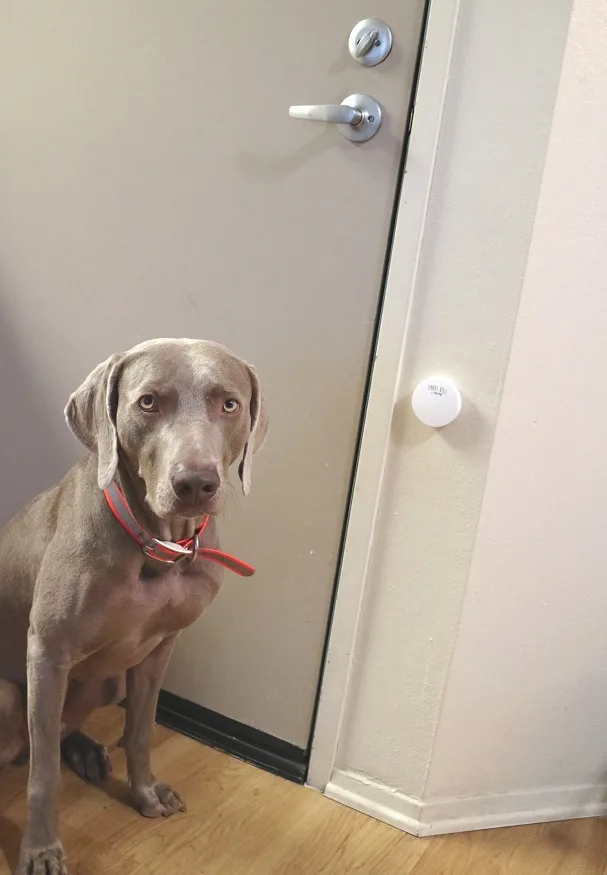
4. Limit “play fighting” with your dog
I believe most dogs (even Remy) can learn it’s OK to “play bite” during play with certain people and that it’s not OK to play bite when greeting people.
However, obviously if you’re trying to discourage “play biting” from your dog then you might want to stop “play fighting” and roughhousing with him.
Any smart trainer would tell her clients never to play fight with a dog. That being said, I “play fight” with Remy sometimes and I don’t plan to stop. Here’s a post about it.
I just wanted to list this here because it’s something for all of us to think about. If you play fight or wrestle with your dog, obviously you are encouraging him to play bite and sometimes there are consequences to that.
5. Teach visitors what you mean by “ignoring” the dog
Like I said, most people don’t understand how to ignore a dog, so explain to people exactly what they should do (or shouldn’t do). Most people think they need to engage with your dog so as not to appear rude.
My dog was perfectly behaved – and I do mean perfect! – whenever we had our apartment maintenance man over because Mike would truly ignore Remy. If the person really has no opinion about my dog and therefore ignores him, Remy acts calm and normal! Haha.
The problem is, most people feel obligated to acknowledge him or they love dogs and want to pet him. So … sometimes you just have to tell people it’s OK to leave your dog alone.
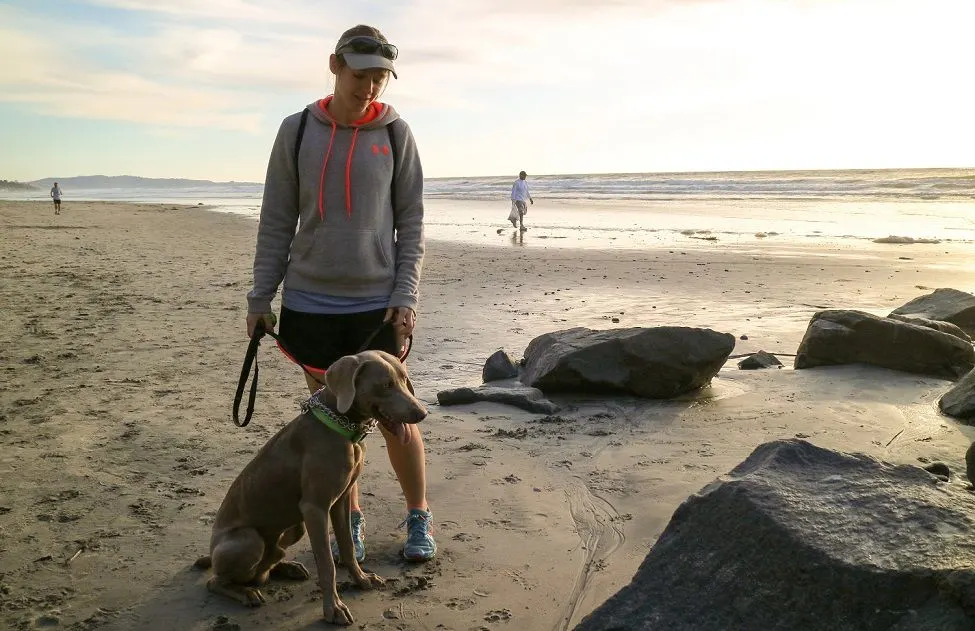
6. Work on general impulse control.
Increasing your dog’s impulse control is important in general because it will help him be a more well-mannered dog.
While we often focus on getting our dogs and puppies to stop a specific “bad” behavior like jumping or nipping or barking, working on increasing the dog’s overall self-control is very important because it will spill over into ALL training.
Here is a post all about how to increase your dog’s impulse control.
Some ideas from that post include: working on general obedience skills, using a clicker to “shape” new behaviors and playing “take it/leave it” games where your dog has to leave a treat alone until you say “take it.”
Learn more about increasing a dog’s impulse control here.
7. Go back to a basic obedience class.
I highly recommend enrolling your dog in an obedience class that focuses on preparing for the “Canine Good Citizen” test. This is a test organized by the AKC that tests the dog on 10 elements. The first three are very specific to what we’re discussing in this post:
1. The dog must “accept” a friendly stranger. No jumping, aggression or fear. The dog has to be able to sit or stand and act normal around the evaluator.
2. The dog must sit or stand politely while the friendly stranger pets him. Again, no aggression or fear, no jumping or mouthing.
3. The dog must sit or stand nicely for grooming. The evaluator will pet the dog some more, brush the dog, lift each of the dog’s front paws and touch each of his ears.
Believe it or not, Remy passed the CGC test a year ago! We sure fooled them!
However, that doesn’t mean we can’t go back and take additional obedience classes to continue working on his greeting skills. He still has a LOT of work to do. Training is ongoing.
No magic solution, training is ongoing!
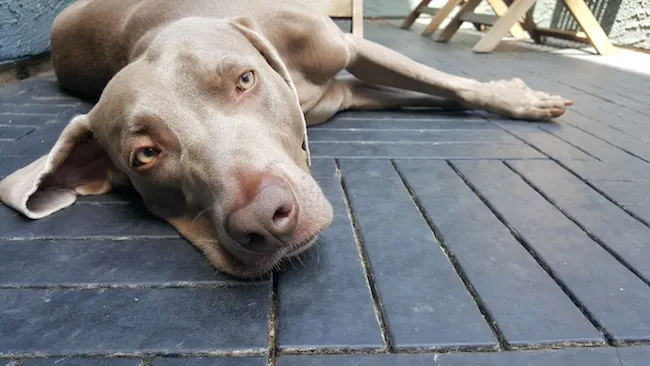
So, if you’ve made it this far you’ve probably figured out there is no magic solution to stop your adult dog from mouthing and play biting at people’s hands. Instead, there are several things you can work on that should help decrease this behavior over time.
Most importantly, I would say it’s best to truly ignore this behavior other than perhaps a firm “no” if that works for your dog.
Second, I highly recommend taking a class that preps you for the Canine Good Citizen test. That will give you many opportunities to practice greeting people with your dog in a controlled environment (and understanding people!).
Does your adult dog mouth and bite people’s hands?
In the comments, let us know what questions you have or what suggestions you have for the rest of us.
Additional resources:

Matt
Thursday 11th of October 2018
Thanks Lindsay! Great article. Your advice and tips will definitely help me with my little puppy at home as well.
Julia at Home on 129 Acres
Monday 8th of October 2018
Bax very occasionally mouths when we play. As you say, it's gentle and we actually find it funny and enjoy him when he does it. We don't have issues with mouthing other times.
Petting under the chin is a great tip. I find a lot of dog people tend to do this naturally. But most people's inclination is to go for the top of the head. Then the dog is looking around trying to see the person's hand and figure out what's happening. They're much more comfortable if people come in under the chin.
Lindsay Stordahl
Tuesday 9th of October 2018
Funny, I can't imagine Baxter mouthing your hands. Haha! He's such a good boy.
Maria Kane
Monday 8th of October 2018
Young dogs usually learn bite inhibition during play with other dogs. If you watch a group of dogs playing, you’ll see plenty of chasing, pouncing and wrestling. Dogs also bite each other all over. Every now and then, a dog will bite his playmate too hard. The victim of the painful bite yelps and usually stops playing. The offender is often taken aback by the yelp and also stops playing for a moment. However, pretty soon both playmates are back in the game. Through this kind of interaction, dogs learn to control the intensity of their bites so that no one gets hurt and the play can continue without interruption. If dogs can learn from each other how to be gentle, they can learn the same lesson from people.
Pat
Sunday 7th of October 2018
Lindsay, what happened to the weekly emails with these links and other ibbformation from Lindsay and That Mutt? Emails do not go thru as the box is full. We are worried about you lady.
Lindsay Stordahl
Sunday 7th of October 2018
The emails go out on Tuesdays typically. Thanks for letting me know my inbox might be having an issue. Looking into it now.